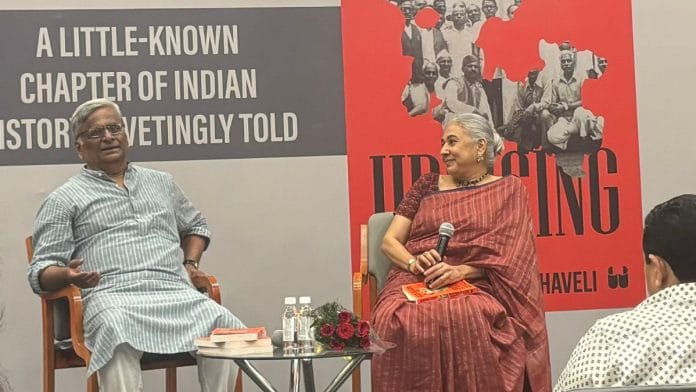New Delhi: Twenty-nine ordinary young men with five pistols and three rifles attacked and defeated over 300 armed soldiers in a struggle for freedom still unknown to most of the country. The liberation of Dadra and Nagar Haveli from the Portuguese in 1954 is a largely overlooked part of India’s struggle for Independence.
Neelesh Kulkarni’s new book, Uprising: The Liberation of Dadra and Nagar Haveli, seeks to remedy this. “It is a story known to such a small section of people, and particularly only to those who were a part of it. It deserved to be heard on a larger scale, so I had to write the book,” said Kulkarni in conversation with author and historian Swapna Liddle at the book’s recent launch event in Delhi’s India International Centre.
It was attended by Kulkarni’s family and friends, as well as members of his publishing and marketing team from Westland Books. Loud hooting and cheers sounded each time he spoke. “There’s so much love compressed in this small room,” he said at the beginning of the event.
Liberation of Dadra & Nagar Haveli
Neelesh Kulkarni described his journey of writing Uprising as “a series of coincidences”. On a train journey to Nashik, while researching his previous novel, In the Footsteps of Rama: Travels with the Ramayana (2021), Kulkarni chanced upon Arvind Manolkar, who participated in the freedom struggle of Dadra and Nagar Haveli. During this journey, Manolkar narrated his story to Kulkarni.
“When I heard it, it took hold of me. The story was so powerful,” Kulkarni said. He told Manolkar about his desire to write a book on the topic and spent the next three years researching and writing.
At the event, Kulkarni thanked everyone who spoke to him and helped him find sources and references for Uprising. Manolkar, who is the president of the Dadra and Nagar Haveli Swatantrata Sangram Samiti, was also present.
Now a Union Territory, Dadra and Nagar Haveli is a collection of 72 small villages between Gujarat and Maharashtra. The Portuguese occupied Dadra in 1783 and Nagar Haveli in 1785, and did not leave until they were ousted by a revolution in 1954.
“Perhaps it was fitting that the Portuguese, the first foreigners to set up a base in India, were also the last to leave,” Kulkarni writes in the introductory chapter of Uprising.
Even after India’s Independence from the British in 1947, the Portuguese colonial powers were unwilling to relinquish control over regions including Goa, Daman, Diu, Dadra, and Nagar Haveli. Due to international diplomacy concerns with NATO, the government of a newly liberated India under Prime Minister Jawaharlal Nehru didn’t intervene in the matter.
A group of 29 young men then decided to take matters into their own hands, which birthed the armed revolution of 2 August 1954. They attacked and threw out Portuguese occupiers from the capital Silvassa, and raised Indian flags in the place of Portuguese ones.
Also read: Hindi poet Vinod Shukla knows the modern art of storytelling. He’s now the subject of new movie
Weaving narratives together
Uprising is an amalgamation of interviews, memoirs, newspaper reports, and government documentation. Kulkarni said that the biggest difficulty was to bring together the narratives of the different groups involved. There were at least four: The Rashtriya Swayamsevak Sangh (RSS) from Pune, the Azad Gomantak Dal (AGD) from Goa, members of the Warli tribe, and the Communist Party of India (CPI).
These groups worked together to liberate Dadra and Nagar Haveli, often with each other but sometimes even against each other. They had different origins and sometimes even different approaches toward the struggle. Memoirs of people from each of these groups also have different stories of the same events.
“When writing a memoir, there is an inherent bias in which you tend to exaggerate your group’s contribution as compared to the others,” said Kulkarni.
His most challenging task, thus, was to bring together parallel narratives and put them in a linear form while giving due respect to all the contributors.
During their conversation, Kulkarni and Liddle discussed the different people associated with the Dadra and Nagar Haveli freedom movement and Kulkarni’s journey with contacting them. Notable among these were Bollywood singers Lata Mangeshkar and Mohammad Rafi, who organised concerts in support of the movement. The revenue from these shows was used by the young men of Dadra and Nagar Haveli to purchase five rifles and three pistols from the black market in Hyderabad.
Emphasising the importance of a book like Uprising, Liddle told ThePrint, “Documentation exists at various levels, but we don’t know about it. Somebody like Neelesh brings this information out into a wider public circulation. To talk about it and get more people reading about it is a very big step.”
(Edited by Prasanna Bachchhav)






